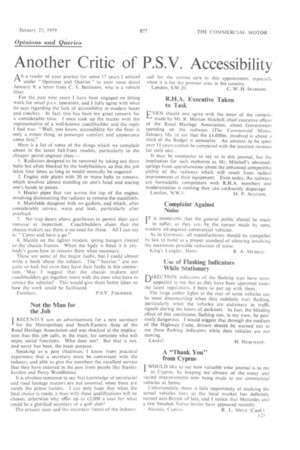Another Critic of P.S.V. Accessibility
Page 59

If you've noticed an error in this article please click here to report it so we can fix it.
A S a reader of your journal for some 17 years I noticed under "Opinions and Queries" in your issue dated January 9, a letter from C. S. Bettinson, who is a vehicle fitter.
For the past nine years I have been engaged on fitting work for small p.s.v. operators, and I fully agree with what he says regarding the lack of accessibility in modern buses and coaches. In fact, this has been my great concern for a considerable time. I once took up the matter with the representative of a well-known coachbuilder and the reply I had was: "Well, you know, accessibility for the fitter is only a minor thing; as passenger comfort and appearance come first."
Here is a list of some of the things which we complain about in the latest full-front models, particularly in the cheaper petrol-engined class:— 1. Radiators designed to be removed by taking out three bolts but often blocked by the bodybuilders, so that the job takes four times as long as would normally be required.
1 Engine side plates with 20 or more bolts to remove. which involves almost standing on one's head and tearing one's hands to pieces.
3. Heater pipes that run across the top of the engine, involving dismounting the radiator to remove the manifolds.
4. Manifolds designed with no gaskets, and which, after considerable service, warp and leak, particularly after overhaul.
5. No trap doors above gearboxes to permit their easy removal or inspection. Coachbuilders claim that the chassis makers say there is no need for these. All I can say is: " Come and have a go."
6. Mainly on the lighter models, spring hangers riveted to the chassis frames. When the bpdy is fitted it is anybody's guess how to remove them when necessary.
These are some of the major faults, but I could almost write a book about the subject. The " heavies " are not quite so bad, but even they have their faults in this connection. May I suggest that the chassis makers and coachbuilders get together more with the men who have to service the vehicles? This would give them better ideas on how the work could be facilitated.
Farnham. P.S.V. ENGINEER.
Not the Man for the Job I RECENTLY saw an advertisement for a new secretary
for the Metropolitan and South-Eastern Area of the Road Haulage Association and was shocked at the implication that this job calls, in the main, for someone who will enjoy social functions. Who does not? . But that is not, and never has been, the main purpose.
Speaking as a past chairman, I know from practical experience that a secretary must be conversant with the industry and able to give the members the excellent service that they have enjoyed in the past from people like Stanley Jardine and Percy Woodhouse.
It is absolute nonsense to say that knowledge of secretarial and road haulage matters are not essential, when these are surely the prime factors. I can only hope that when the final choice is made, a man with these qualifications will he chosen, otherwise why offer up to £2,000 a year for what could be a glorified secretary of a golf club?
The present state and the uncertain future of the industry call for the utmost care in this appointment, especiall when it is for the premier area in the country.
London, S.W.20. C. W. H. SPARROW.
R.H.A. Executive Taken to Task
EVEN should one agree with the tenor of the remark= made by Mr. R. Morton Mitchell, chief executive officer of the Road Haulage Association, about Government spending on the railways (The Commercial Molor, January 16), to say that the £1,600m. involved is about a third of the Budget is untenable: An amount to be spent over 15 years cannot be compared with the taxation revenue for only one.
It may be unpopular to say so in this journal, but the inspiration for such outbursts as Mr. Mitchell's obviously springs from apprehensions about the enhanced competitive ability of the railways which will result from radical improvement of their equipment. Even today, the railways are formidable competitors with R.H.A. members and modernization is nothing they can cocksurely disparage.
London, N.W.3. M. P. MACHIN.
Complaint Against Noise
I T is intolerable that the general public should be made to suffer, as they arc, by the uproar made by some modern oil-engined commercial vehicles.
As in Germany. all manufacturers should be compelled by law to build to a proper standard of silencing involving the maximum possible reduction of noise.
King's Langley. Herts. R. A. MURRAY.
Use of Flashing Indicators While Stationary D1RECTION indicators of the flashing type have never appealed to me, but as ,they have been approved under the latest regulations. I have to put up with them.
The large amber lights at the rear of some vehicles can be most disconcerting when they suddenly start flashing, particularly when the vehicles are stationary at traffic signals during the hours of darkness. la fact, the blinding effect of this continuous flashing can, in my view, be positively dangerous. I would suggest that through the medium of the Highway Code, drivers should be warned not to use these flashing indicators while their vehicles are not moving.
Card lir H. MERCHANT.
A "Thank You" from Cyprus I WOULD like to say how valuable your journal is to me I in Cyprus, by keeping me abreast Of the many and varied improvements now being made to our commercial vehicles at home.
Unfortunately, there is little opportunity of studying the actual vehicles here as the local market has definitely turned anti-British of late, and I notice that Mercedes and a few Swedish Volvo lorries have appeared recently.
Nicosia, Cyprus. R. L. IVIELK (Capt.)




































































































































































































